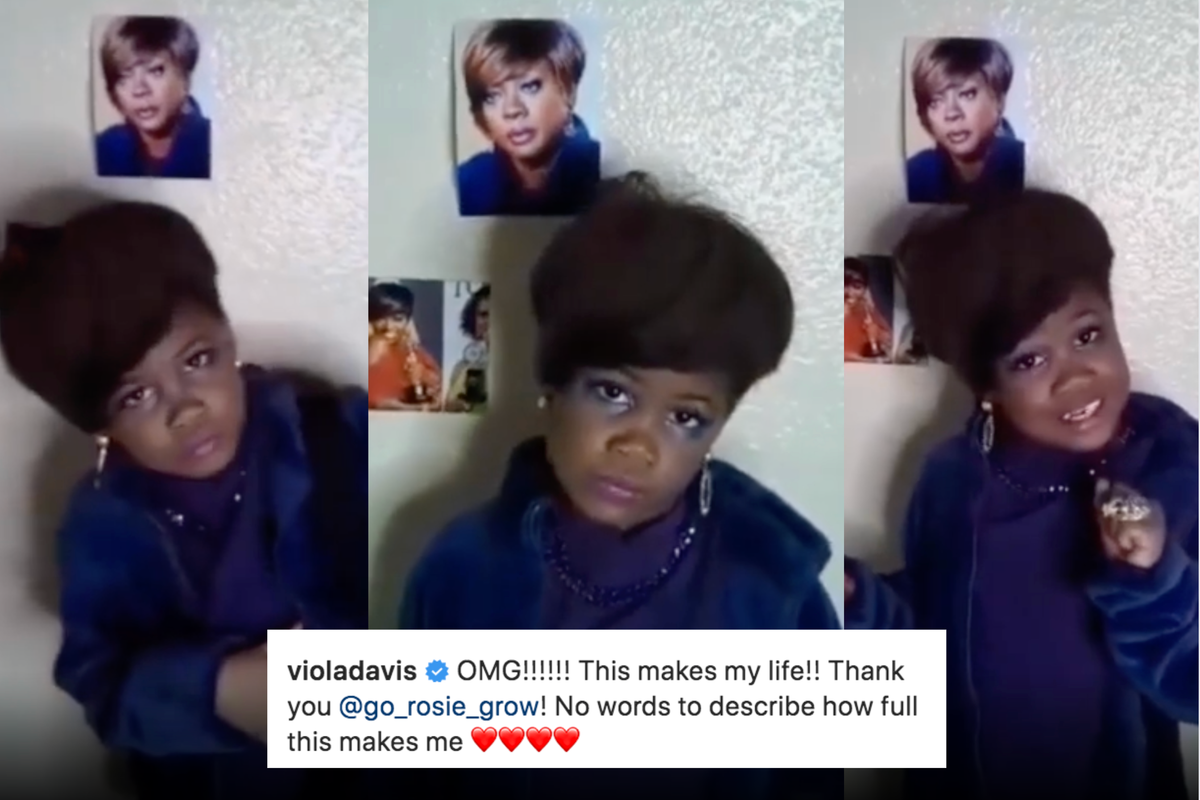6-year-old girl absolutely slays as a tiny Viola Davis, Sha'Carri Richardson and more
Rosie White, as Viola Davis, as Annalise Keating.
One mommy-daughter duo is winning hearts by taking dress-up to a whole new level.
Six-year-old Rosie White is going viral and making headlines for sharing the inspiring stories of Black entertainers, leaders and history makers—using spot-on costumes made by her mother Kenya White, along with her own special dash of Black girl magic.
You might have recently seen Rosie (@go_rosie_grow) boldly channeling multiaward-winning actress Viola Davis, complete with that meme-worthy “grabbing of the purse stare down” we all know and love from “How to Get Away With Murder.”
I mean, where does Davis end and White begin?! Someone give this child an Emmy!
Even Davis saw the video and reposted it. So I’m sure that’s award enough for now.
As Kenya recalls in a Scary Mommy interview, the idea behind this treasure trove of uncanny impressions came when Rosie was just 3 years old. After her daughter was given a printout about Rosa Parks in preschool, Kenya discovered that little Rosie completely memorized all of the information and could recite back what she had just read.
Inspired, Kenya grabbed a makeshift Rosa Parks costume and grabbed her phone, telling her daughter to “do it again!” And from there, a blend of history, creativity and pure joy ensued.
Since then, Rosie has created hundreds (yes, hundreds) of videos featuring prominent Black figures, and received lots of love for her fun personality and God-given talent. Scary Mommy reported that Whoopi Goldberg sent a box of books and Erykah Badu started following her.
Some of my personal favorites are when Rosie pretends to be male figures. Cause, well … little kids in fake mustaches. That’s a level of adorable that can’t be beat.
Her pop star and diva ones are quite amazing too.
*standing ovation*
For Black History Month, Rosie and Kenya are doubling down and releasing a video every Monday and Thursday. Thursdays honor Black inventors, like Sarah Boone, who improved the ironing board, George Crum, creator of the potato chip, Garret Morgan, inventor of the traffic light.
Seriously, if this child doesn’t become an actress, I hope she becomes a history teacher because I am learning so much. And having fun while doing so.
A lot of inspiration also comes from current events, like track star Sha’Carri Richardson following her unfair disqualification from the Olympic Games.
Her tiny tattoos! I can't even...
And though occasionally Rosie will delve into more serious stories, like Breonna Taylor, Kenya says that the tone is consciously celebratory.
“When I was six years old I learned about the negativity of Black history,” Kenya told Scary Mommy. “I didn’t want to teach her such darkness about Black history. Right now it’s all positivity.”
Positivity, yes. But also inspiration. Especially to young Black girls. Kenya told Good Morning America, the message behind these videos is that “you can do anything you want. You can be Kamala Harris, you can be Michelle Obama, you can be beyond those ladies. Whatever your heart desires, whatever you want to do, whether you're an artist or dancer, into politics, just be the best you you can be."
That includes GMA co-anchor Robin Robertson, who now has a “mini-me,” thanks to Rosie.
Next month is Women’s History Month, and we are all very excited to see what Rosie and Kenya come up with. Perhaps Biden’s Supreme Court nominee? We’ll have to wait and see. In the meantime, sifting through these videos is more than enough to make you, to quote The Lovin' Spoonful, “believe in magic in a young girl’s heart.”
Way to go Rosie. Following your bliss reminds us all to do the same.
- See The Incredible Black Women Honored By These Girls In This ... ›
- Michelle Obama's instantly classic speech at the 'Black Girls Rock ... ›
- The Dear Black Girl project was for black women. So here's what a ... ›

